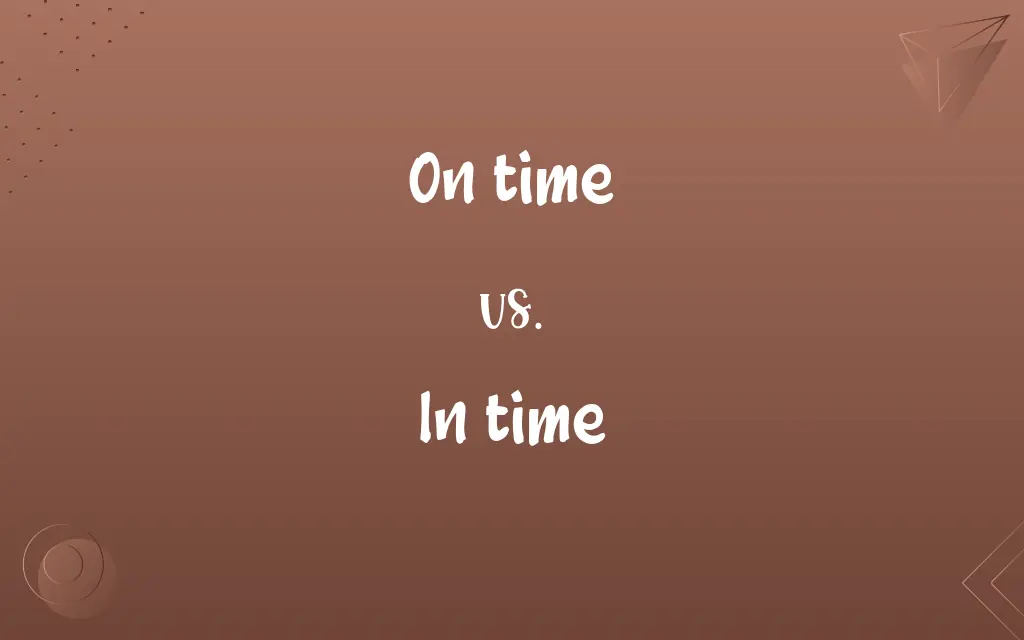On time vs. In time: Know the Difference

By Shumaila Saeed || Published on January 29, 2024
"On time" means being exactly punctual, whereas "In time" suggests being early or just before a deadline, allowing for some flexibility.

Key Differences
On time refers to the act of being exactly punctual, adhering strictly to the set or expected time. For instance, when a meeting is scheduled for 10 AM, arriving "on time" means being there exactly at 10 AM. This term is often used in contexts where precise timing is crucial, such as public transportation schedules or appointment times.
Shumaila Saeed
Jan 29, 2024
In time, conversely, implies arriving or doing something before a deadline or a significant moment, but not necessarily being precise to the minute. For example, arriving "in time" for a movie might mean getting there just before it starts, not necessarily at the time printed on the ticket. This phrase often carries a connotation of avoiding lateness, but with a bit more flexibility than "on time."
Shumaila Saeed
Jan 29, 2024
On time is typically associated with schedules and timetables, emphasizing adherence to a predetermined or agreed-upon time. It's often used in professional and formal settings where timekeeping is essential. For example, "The train arrived on time," indicates that the train reached the station at the exact scheduled time.
Shumaila Saeed
Jan 29, 2024
In contrast, In time is less about strict adherence and more about the adequacy of time in relation to an event. It's often used in scenarios where there's a window of time rather than a precise moment. For example, "He arrived in time to see the beginning of the concert," suggests that he got there before it started, but not necessarily at the start time.
Shumaila Saeed
Jan 29, 2024
On time is often used in contexts where there's little to no margin for error regarding timing. It's a term that indicates reliability and punctuality, often in a professional context. For example, "She is always on time for meetings," suggests a consistent adherence to the scheduled start times.
Shumaila Saeed
Jan 29, 2024
ADVERTISEMENT
In time, on the other hand, can imply a sense of urgency or a narrow avoidance of being late. It's often used when there's a critical cutoff point, and arriving just before it suffices. For example, "They submitted the application just in time," means the submission was close to the deadline but not late.
Shumaila Saeed
Jan 29, 2024
On time can also reflect a person's character or habit, especially in terms of their time management skills. Being "on time" is generally seen as a sign of respect and professionalism, indicating that one values others' time as well as their own.
Shumaila Saeed
Jan 29, 2024
In the context of In time, the emphasis is more on the outcome, ensuring that one is not late for the essential part of an event or deadline. It's more about the result (being there before it's too late) rather than the process (arriving at a specified time).
Shumaila Saeed
Jan 29, 2024
Comparison Chart
Definition
Arriving or doing something at the scheduled or exact time
Arriving or doing something before a deadline or significant moment
Shumaila Saeed
Jan 29, 2024
Associated Context
Strict schedules and professional settings
Situations with a deadline or critical moment
Shumaila Saeed
Jan 29, 2024
ADVERTISEMENT
Implication
Precision and punctuality
Adequate timing, often with some urgency
Shumaila Saeed
Jan 29, 2024
Emphasis
Adherence to a specific time
Avoiding lateness, with some flexibility
Shumaila Saeed
Jan 29, 2024
On time and In time Definitions
On time
"On time" is used when precision in timing is important.
He submitted his report on time for the deadline.
Shumaila Saeed
Jan 06, 2024
In time
"In time" implies sufficient timing, though not necessarily precise.
We got there in time to see the opening act.
Shumaila Saeed
Jan 06, 2024
ADVERTISEMENT
On time
"On time" means arriving or completing something at a scheduled or exact time.
The meeting started right on time at 9 AM.
Shumaila Saeed
Jan 06, 2024
In time
"In time" is often used in situations with some urgency.
They reached the hospital in time for the emergency treatment.
Shumaila Saeed
Jan 06, 2024
On time
"On time" indicates punctuality and adherence to a specific time.
The bus always arrives on time at the stop.
Shumaila Saeed
Jan 06, 2024
In time
"In time" indicates avoiding the negative consequences of being late.
The application was submitted in time to be considered.
Shumaila Saeed
Jan 06, 2024
On time
"On time" reflects a commitment to scheduled timelines.
She prides herself on always being on time for appointments.
Shumaila Saeed
Jan 06, 2024
In time
"In time" means arriving or doing something before it's too late.
She arrived just in time to catch the train.
Shumaila Saeed
Jan 06, 2024
On time
"On time" is often associated with reliability and professionalism.
The project was completed on time, showcasing the team's efficiency.
Shumaila Saeed
Jan 06, 2024
In time
"In time" suggests a close call with a deadline or critical moment.
He finished the task in time for the important presentation.
Shumaila Saeed
Jan 06, 2024
Repeatedly Asked Queries
Can 'in time' imply a sense of urgency?
Yes, it often suggests narrowly meeting a deadline or important moment.
Shumaila Saeed
Jan 29, 2024
What is the key difference between 'on time' and 'in time'?
'On time' means being exactly punctual, while 'in time' suggests being early enough to avoid being late.
Shumaila Saeed
Jan 29, 2024
Does 'on time' indicate reliability?
Yes, being 'on time' is often associated with reliability and professionalism.
Shumaila Saeed
Jan 29, 2024
Is 'on time' more precise than 'in time'?
Yes, 'on time' refers to exact timing, whereas 'in time' allows for some leeway.
Shumaila Saeed
Jan 29, 2024
Can 'in time' mean avoiding negative consequences?
Yes, it means doing something early enough to avoid problems associated with lateness.
Shumaila Saeed
Jan 29, 2024
Is 'in time' used when there's a critical cutoff point?
Yes, it's used when arriving before a critical moment or deadline is necessary.
Shumaila Saeed
Jan 29, 2024
How does 'on time' reflect on personal habits?
It reflects good time management and respect for schedules.
Shumaila Saeed
Jan 29, 2024
Does 'in time' involve a window of opportunity?
Yes, it implies a timeframe in which arriving or completing something is acceptable.
Shumaila Saeed
Jan 29, 2024
Is 'in time' indicative of just avoiding being late?
Yes, it means being early enough to not be considered late.
Shumaila Saeed
Jan 29, 2024
How is 'on time' perceived in a work environment?
It's usually seen as a sign of professionalism and efficiency.
Shumaila Saeed
Jan 29, 2024
Can 'in time' be used in emergency situations?
Yes, like arriving 'in time' for urgent medical treatment.
Shumaila Saeed
Jan 29, 2024
Is being 'on time' important in professional settings?
Yes, it's crucial in settings where adherence to schedule is valued.
Shumaila Saeed
Jan 29, 2024
Can 'on time' be used in casual settings?
Yes, but it's more commonly associated with formal or professional contexts.
Shumaila Saeed
Jan 29, 2024
Does 'in time' suggest flexibility?
Yes, it suggests that exact timing is less critical than avoiding lateness.
Shumaila Saeed
Jan 29, 2024
Can 'in time' be stressful?
It can be, especially if the timing is very close to a deadline or critical moment.
Shumaila Saeed
Jan 29, 2024
Does 'on time' require planning?
Yes, it often requires careful planning and time management.
Shumaila Saeed
Jan 29, 2024
Is 'in time' more common in casual speech?
Yes, it's often used in more informal or less rigid contexts.
Shumaila Saeed
Jan 29, 2024
Is 'on time' used in public transportation contexts?
Yes, it's often used to indicate adherence to a timetable.
Shumaila Saeed
Jan 29, 2024
Does 'on time' relate to punctuality?
Yes, it's directly related to being punctual.
Shumaila Saeed
Jan 29, 2024
Can 'on time' be a character trait?
Yes, consistently being 'on time' can be seen as a positive personal attribute.
Shumaila Saeed
Jan 29, 2024
Share this page
Link for your blog / website
HTML
Link to share via messenger
About Author
Written by
Shumaila SaeedShumaila Saeed, an expert content creator with 6 years of experience, specializes in distilling complex topics into easily digestible comparisons, shining a light on the nuances that both inform and educate readers with clarity and accuracy.









































































